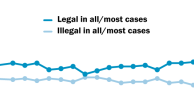About a quarter of Indians (23%) say there is “a lot of discrimination” against women in their country. And 16% of Indian women reported that they personally had faced discrimination because of their gender in the 12 months before the 2019-2020 survey.
In addition, three-quarters of adults see violence against women as a very big problem in Indian society. To improve women’s safety, about half of Indian adults (51%) say it is more important to teach boys to “respect all women” than to teach girls to “behave appropriately.” But roughly a quarter of Indians (26%) take the opposite position, effectively placing the onus for violence against women on women themselves.
On the whole, however, Indians seem to share an egalitarian vision of women’s place in society. Eight-in-ten people surveyed – including 81% of Hindus and 76% of Muslims – say it is very important for women to have the same rights as men. Indians also broadly accept women as political leaders, with a majority saying that women and men make equally good political leaders (55%) or that women generally make better leaders than men do (14%).
Yet these views exist alongside a preference for traditional economic roles. Indians generally agree that when there are few jobs available, men should have more rights to a job than women (80%), including 56% who completely agree with this statement. Majorities of both men and women share this view, though men are somewhat more inclined to take this position.
Most Indian women do not perceive widespread discrimination against women in India
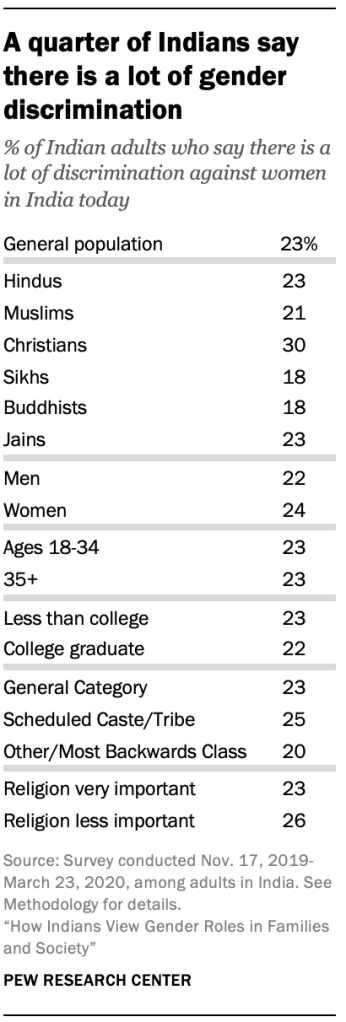
Roughly a quarter of Indians (23%) say there is “a lot of discrimination” against women in India today. (Respondents were given two options; they could either say there is a lot of discrimination against women, or there is not a lot of discrimination.) Christians are the religious community most likely to perceive widespread discrimination against women in India (30%).
Indian women are only slightly more likely than Indian men to say there is a lot of discrimination against women in the country (24% vs. 22%, respectively). In general, views on gender discrimination do not differ much – if at all – between respondents of different ages or education levels.
While most Indians do not perceive a lot of gender discrimination in their country, Indians are modestly more likely to say there is a lot of discrimination against women than to say the same about discrimination against religious groups or lower castes.
Indians in different regions have very different perceptions of how much discrimination women face. In general, respondents in the South are more likely than those in the Hindi Belt to feel there is a lot of discrimination against women in India today. For example, in the Southern states of Telangana and Tamil Nadu, more than a third of adults say there is a lot of discrimination against women (44% and 39%, respectively). By contrast, in the Hindi Belt states of Himachal Pradesh and Uttar Pradesh, only 6% of respondents say this is the case. As Pew Research Center previously has reported, South Indians also are more likely than Indians in the Hindi Belt to perceive a lot of discrimination against Scheduled Castes and Scheduled Tribes.
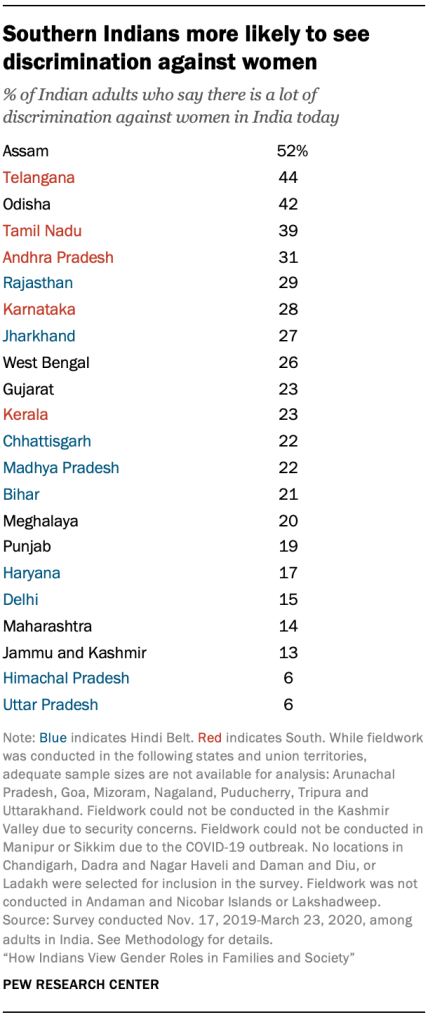
The Northeastern state of Assam stands out, with 52% of respondents reporting widespread gender discrimination. This mirrors the broader pattern of respondents in the Northeast being among the most likely to say there is a lot of discrimination in India against people from various religious groups and from lower castes. But in general, the majority of Indians in most states and union territories say there is not a lot of discrimination against women.
Most Indian women say they have not recently experienced gender discrimination
Fewer than one-in-five Indian women (16%) said they had personally felt discriminated against in the 12 months before the 2019-2020 survey because of their gender. And women were only slightly more likely than men to say they had experienced gender discrimination in the past year (16% vs. 14%, respectively).
Christians – despite being the most likely religious group to say there is a lot of discrimination against women in India – had the lowest rate of women personally reporting discrimination because of their gender (9%).

Across India, women in different age groups and with different levels of education reported experiences with gender discrimination at roughly similar rates. However, women who had faced recent financial difficulties (those who said they had not been able to afford food, housing or medical care for themselves or their families in the last year) were twice as likely as those who had not recently faced such financial difficulties to report that they personally had experienced gender discrimination in the past year (22% vs. 11%).
Survey respondents’ personal experiences with gender discrimination also varied across the country. On the upper bound, women in Jammu and Kashmir and in Assam reported the highest levels of personal gender discrimination in the past year (35% and 32%, respectively), while women from Gujarat and Andhra Pradesh were among the least likely to say they personally had faced discrimination because of their gender (7% and 6%, respectively).
Indians favor teaching boys respect as a way to improve women’s safety
Amidst India’s ongoing problem with violence against women, the survey asked respondents whether, to improve the safety of women in their community, it is more important to teach boys to respect all women or to teach girls to behave appropriately.
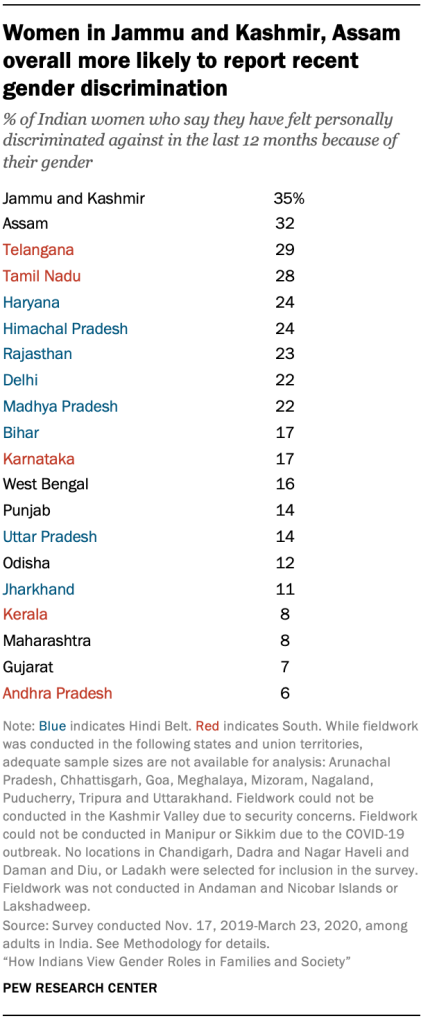
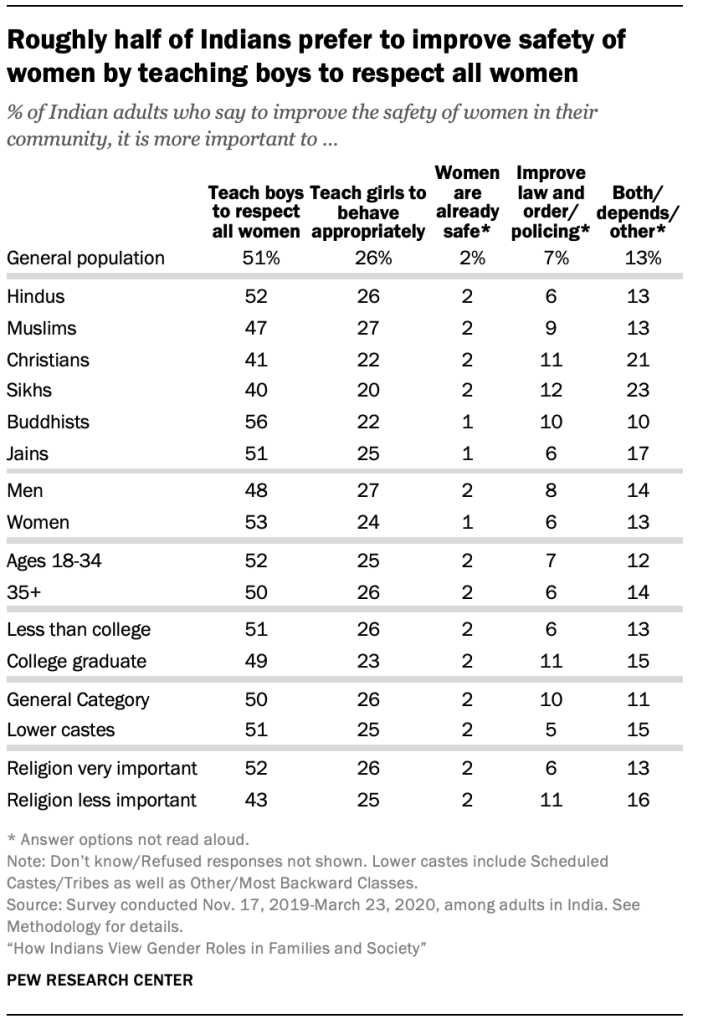
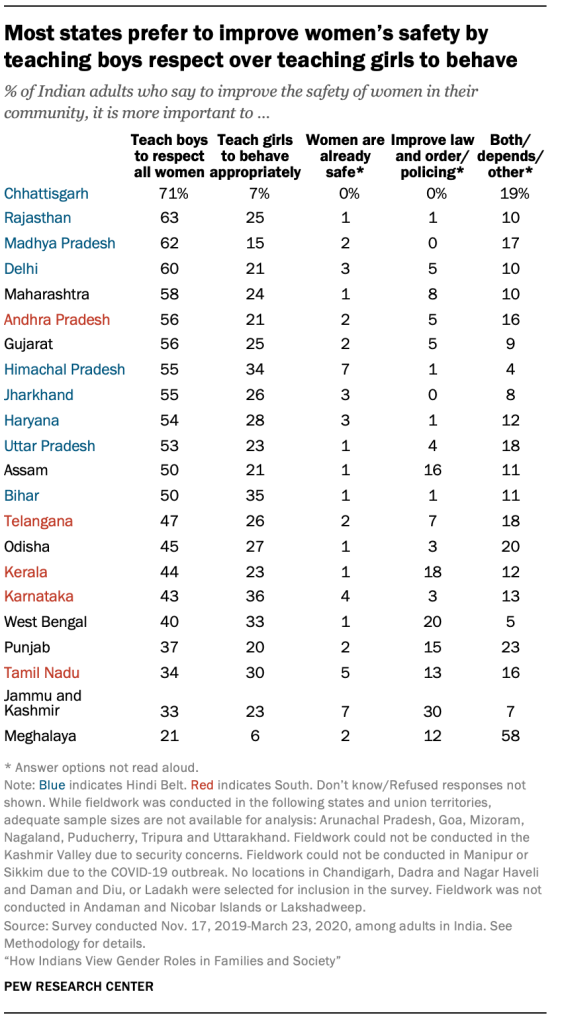
About half of Indians (51%) say it is more important to teach boys to respect all women, while roughly a quarter (26%) say it is more important to teach girls to behave appropriately. Others offer a variety of additional responses, such as that teaching both things is important or that it depends on the situation (13%); that improving law and order or policing is the most important way to protect women’s safety (7%); or that women are already safe (2%). A very small share (2%) did not offer a response to the question.
Women are somewhat more likely than men to say that teaching boys to respect all women is the most important way to improve women’s safety (53% vs. 48%).
Within all of India’s major religious communities, the most common response is “to teach boys to respect all women.” However, while Christians and Sikhs are somewhat less likely than other groups to say this, they are more likely than people in other religious groups to say that both kinds of teaching are important or that the right approach depends on the situation.
While opinion does not vary substantially among Indians of different ages or educational backgrounds, a sizeable gap does emerge around religious commitment. Indians who say religion is very important in their lives are more likely than others to say that teaching boys to respect all women is crucial to improving the safety of women (52% vs. 43%).
Opinions on the best way to improve women’s safety vary considerably across India. For instance, 63% of Rajasthan residents say it is more important to teach boys to respect all women, compared with 40% of people in West Bengal.
In the South, people in neighboring states have differing views. Only about a third of Tamil Nadu residents would prioritize teaching boys to respect all women (34%), compared with over half of Andhra Pradesh locals (56%).
Most Indians say it is very important that women have same rights as men

Most Indian adults (80%) say that, in general, it is very important for women to have the same rights as men, with solid majorities of all major religious groups sharing this view. Buddhists are especially likely to say gender equality is very important (91%), while Muslims and Christians are somewhat less likely than members of India’s other major religious communities to express this sentiment (76% and 70%, respectively).
Nationally, women, younger Indians (ages 18 to 34), and college graduates are slightly more likely than others to say it is very important for women to have the same rights as men.
Overall, Indians with high levels of religious commitment – i.e., those who say religion is very important in their lives – are more likely than other Indians to believe that gender equality is very important (83% vs. 65%). And those with a favorable view of the ruling Bharatiya Janata Party (BJP) are modestly more likely than others to endorse equal rights for women (83% vs. 76%).
Broadly, Indians in the South are somewhat less likely than those elsewhere to say it is very important for women to have the same rights as men. For example, while 80% of Indian adults overall think gender equality is very important, smaller shares in Kerala (72%), Telangana (71%) and Andhra Pradesh (66%) take this position. Still, large majorities across Indian states and union territories share this sentiment.
Most Indians believe women to be equally good political leaders as men
India has a long history of women holding political power, from the 1966 election of Indira Gandhi, one of the world’s first woman prime ministers, to other well-known figures, such as Jayalalitha, Mamata Banerjee and Sushma Swaraj.
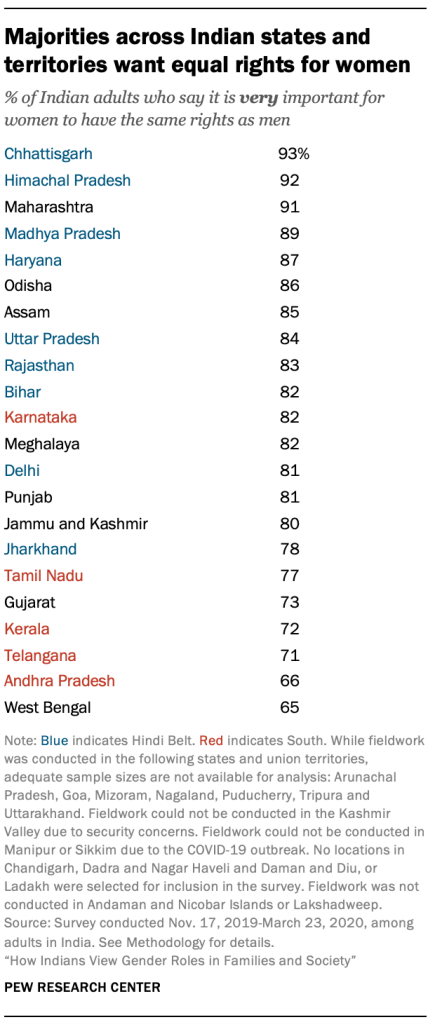
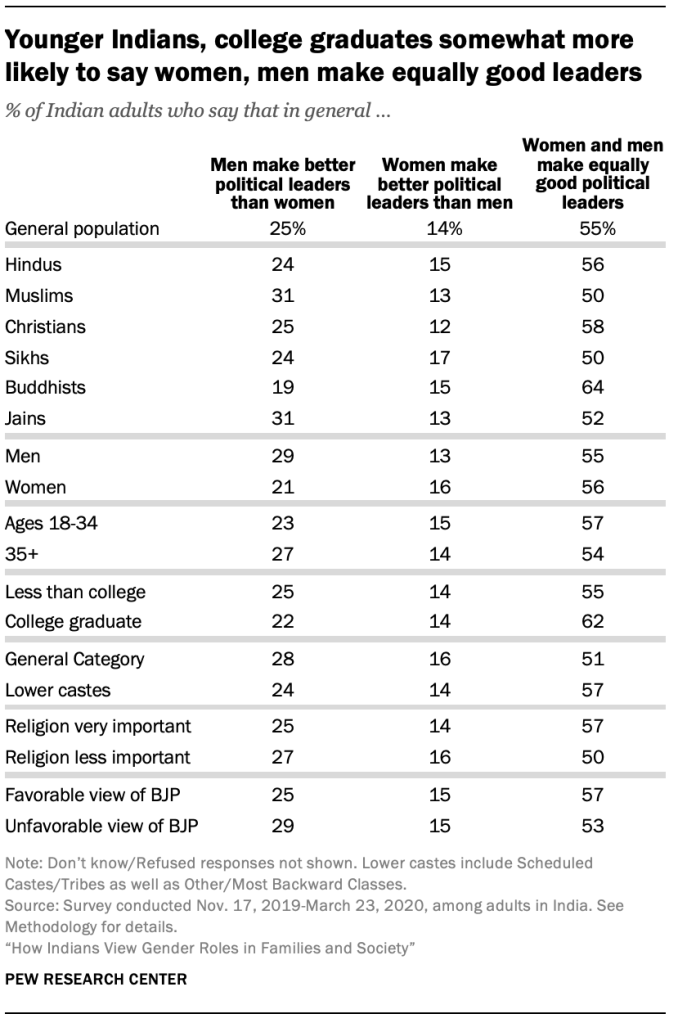
The survey results reflect this comfort with women in politics. Overall, a small majority of respondents express the opinion that, in general, women and men make equally good political leaders (55%). Some Indians (14%) even say women tend to make better political leaders than men. Only a quarter of Indians say that men generally make better political leaders than women.
Modest differences by gender exist. Men are more likely than women to believe men are superior politicians (29% vs. 21%, respectively), while women are slightly more likely to favor the abilities of women leaders (16% vs. 13%).
Younger Indian adults (ages 18 to 34) and college graduates are somewhat more likely than their elders and those with less formal education to say women and men make equally good political leaders.
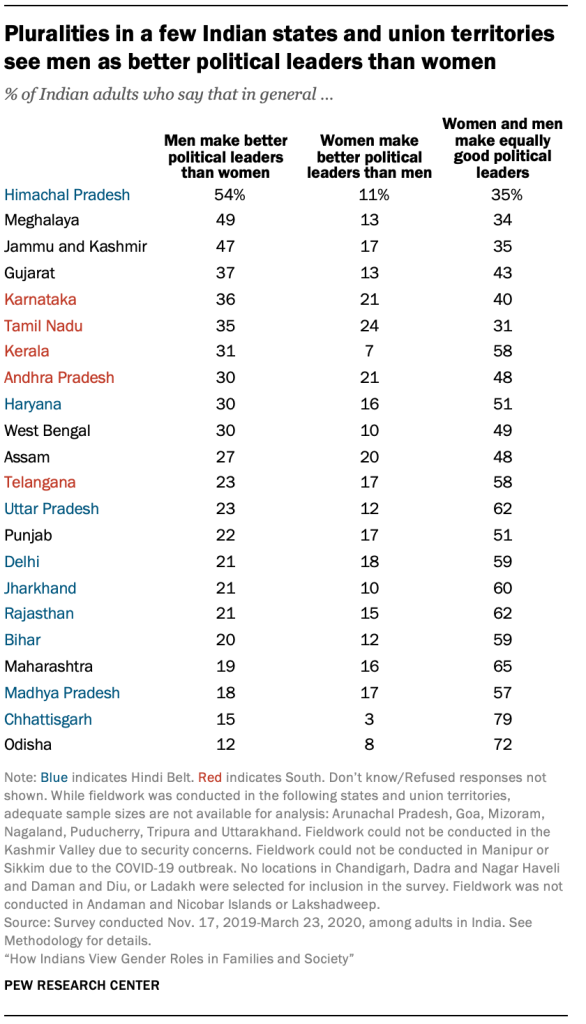
Views on gender and political leadership differ substantially across Indian states. In a handful of states, about a third or more of the population says that men generally make better political leaders than women, including a slim majority in Himachal Pradesh (54%).
By contrast, only about one-in-eight adults in the East Indian state of Odisha (12%) say men make better political leaders. In Odisha and several other states, solid majorities say women and men make equally good political leaders.
In a few states – including the three Southern states of Andhra Pradesh, Karnataka and Tamil Nadu – roughly one-in-five or more people surveyed say women generally make better political leaders than men.
Most men and women think men should be given hiring preference when there are few jobs
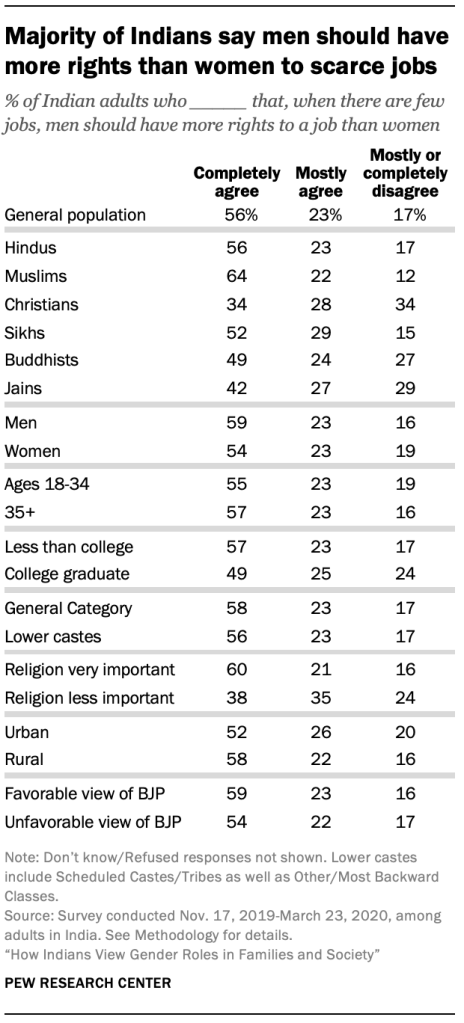
While a majority of Indians express openness to women political leaders and endorse equal rights for women, the vast majority of the population (80%) agrees with the idea that “when there are few jobs, men should have more rights to a job than women,” including 56% who completely agree with that statement. Most Indian women as well as men express total agreement with this statement, though men are somewhat more likely to do so (59% of men vs. 54% of women).
Although the survey was conducted before the COVID-19 pandemic, this question may have become even more relevant because women in India have disproportionately suffered from long-term job losses amidst the pandemic’s economic fallout.
Opinion varies by religious group. Nearly two-thirds of Muslims (64%) completely agree that men should get preference for jobs over women, compared with roughly a third of Christians (34%) who take the same view.
Highly religious Indians are especially likely to fully agree that limited jobs should go to men: Six-in-ten Indians who consider religion very important in their lives say this, compared with about four-in-ten Indians for whom religion is less important (38%).
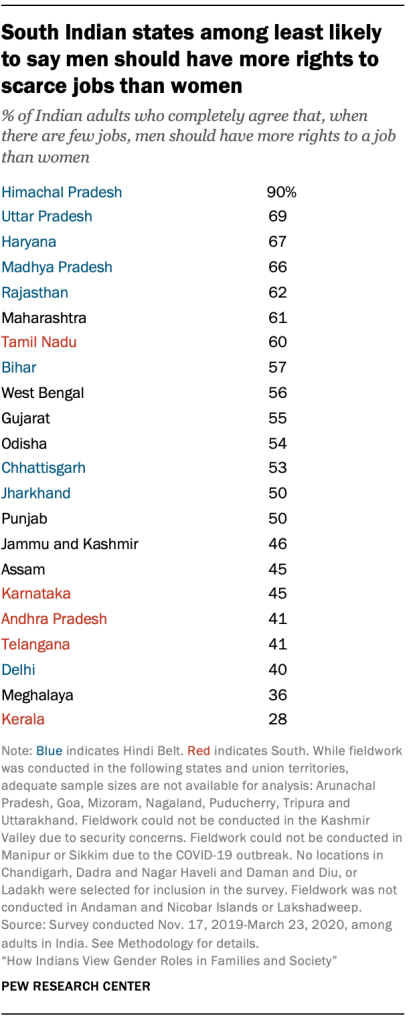
College graduates are somewhat less inclined than others to completely agree that men should have more rights to a job when employment opportunities are scarce (49% vs. 57%).
People in some Southern states are among the least likely to completely agree that men should have more rights to limited jobs than women. Fewer than half of respondents in Karnataka (45%), Andhra Pradesh (41%), Telangana (41%) and Kerala (28%) hold this view.
At the same time, a majority of residents in the Southern state of Tamil Nadu (60%) fully agree that when there are few jobs, men should be given preference in hiring. This view also is prevalent in most Hindi Belt states, such as Uttar Pradesh (69%), Haryana (67%) and Madhya Pradesh (66%). And in Himachal Pradesh, nine-in-ten respondents express total agreement with this notion.


